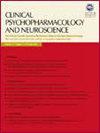阿尔茨海默病患者血清抵抗素水平及其与其他促炎细胞因子的关系
IF 2.4
4区 医学
Q3 NEUROSCIENCES
引用次数: 34
摘要
目的分析阿尔茨海默病(AD)患者血清抵抗素、肿瘤坏死因子α(TNF-α)、白细胞介素-1β、IL-6、IL-18和C反应蛋白(CRP)水平,探讨抵抗素水平与AD患者血清TNF-α、IL-1β、IL-6和IL-18及CRP水平的潜在关系。方法对50例AD患者和30例认知功能正常的健康对照者进行研究。测定血清抵抗素、TNF-α、IL-1β、IL-6、IL-18和CRP水平。我们进行了一项小型精神状态检查(MMSE)来评估一般认知表现。结果AD患者血清抵抗素、IL-1β、IL-18和TNF-α的平均水平显著高于对照组(分别为p=0.026、p=0.002、p=0.003和p=0.038)。IL-6和CRP水平两组间无差异(p=0.874和p=0.941),抵抗素水平与CRP和IL-18水平呈正相关(r=0.526,均p0.05)。结论AD患者血清抵抗素水平明显升高,并与某些炎症标志物相关,提示抵抗素可能在AD的炎症过程中发挥作用。本文章由计算机程序翻译,如有差异,请以英文原文为准。
The Serum Levels of Resistin and Its Relationship with Other Proinflammatory Cytokines in Patients with Alzheimer’s Disease
Objective The present study aims to analyze the levels of resistin, tumor necrosis factor alpha (TNF-α), interleukin (IL)-1β, IL-6, IL-18, and C-reactive protein (CRP) in patients with Alzheimer’s disease (AD) and also investigate a potential relationship between resistin levels and TNF-α, IL-1β, IL-6, IL-18, and CRP levels in patients with AD. Methods The study included fifty patients with AD and 30 healthy controls with normal cognitive functions. The serum resistin, TNF-α, IL-1β, IL-6, IL-18, and CRP levels were assessed. We performed a Mini-Mental State Examination (MMSE) to evaluate the general cognitive performance. Results The mean serum resistin, IL-1β, IL-18, and TNF-α levels were significantly higher in patients with AD compared with the controls (p=0.026, p=0.002, p=0.003, and p=0.038, respectively). The IL-6 and CRP levels did not differ between the groups (p=0.874 and p=0.941). The resistin levels were positively correlated with the levels of CRP and IL-18 (r=0.526, p<0.001; r=0.402, p=0.004, respectively). MMSE scores and inflammatory markers were not correlated (p>0.05 for all). Conclusion Serum resistin levels were significantly increased and correlated with some inflammatory markers in AD patients, suggesting that resistin might play a role in the inflammatory process of AD.
求助全文
通过发布文献求助,成功后即可免费获取论文全文。
去求助
来源期刊

Clinical Psychopharmacology and Neuroscience
NEUROSCIENCESPHARMACOLOGY & PHARMACY-PHARMACOLOGY & PHARMACY
CiteScore
4.70
自引率
12.50%
发文量
81
期刊介绍:
Clinical Psychopharmacology and Neuroscience (Clin Psychopharmacol Neurosci) launched in 2003, is the official journal of The Korean College of Neuropsychopharmacology (KCNP), and the associate journal for Asian College of Neuropsychopharmacology (AsCNP). This journal aims to publish evidence-based, scientifically written articles related to clinical and preclinical studies in the field of psychopharmacology and neuroscience. This journal intends to foster and encourage communications between psychiatrist, neuroscientist and all related experts in Asia as well as worldwide. It is published four times a year at the last day of February, May, August, and November.
 求助内容:
求助内容: 应助结果提醒方式:
应助结果提醒方式:


